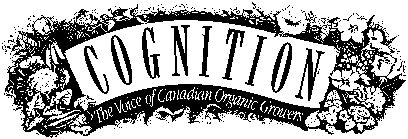

Cognition Index | Virtual Library
| Magazine Rack
Search
| Join the Ecological Solutions Roundtable
EVOLUTION OF THE ORGANIC MOVEMENT IN CANADA
1950s:
Dr. Ehrenfried Pfeiffer’s visit to Canada (to Alvin Filsinger’s) provides inspiration for emergence of organic movement; literature distributed from Europe, U.K. and U.S.A.; first formal organization, in 1953, was the Canadian Organic Soil Association, later called the Land Fellowship, founded by Christopher Chapman, a filmmaker who produced two relevant documentaries, Understanding the Living Soil and A Sense of Humus.
1960s: Lecture tours by Spencer Cheshire on behalf of the Land Fellowship; several organic farms operate successfully; publication of Rachel Carson’s Silent Spring in 1962 fuels environmental movement.
1970s: Organic organizations (including COG in 1975) formed in six provinces, hold annual conferences, publish proceedings and newsletters, and lobby departments of agriculture; International Federation of Organic Agriculture Movements (IFOAM) established in 1972; Ecological Agriculture Projects (EAP) set up in 1974 at MacDonald College (see article on page 12); organic activities across Canada include Urban Rooftop Garden project in Montreal, Ecology House in Toronto, the Ark in P.E.I., City Farmer demonstration gardens in Vancouver; commercial organic farming services and supplies enterprises established, e.g., Eaton Valley Agricultural Service, Oak Manor Farms; 1978 IFOAM conference in Montreal
1980s: "Earthcare – Ecological Agriculture in Saskatchewan" published in 1980; studies and surveys of farmers and consumers conducted: e.g., "Organic Farming in Canada" (Stuart Hill, 1982), "Problems Facing Organic Farmers" (Dee Kramer, COG/Friends of the Earth, 1984), "From Frontier to Mainstream: Sustainable Agriculture in Canada" (Ken McMullen & Eva Durance, 1985); OFPANA established in 1985; a 1988 study finds that 25% of respondents living in Canada’s eight major cities would be willing to buy organic vegetables if price no greater than 125% of conventional price; discussions begun on regulatory support to control use of term organic in the marketplace; April, 1988 conference, "An Organic Food System for Canada"; meeting in November, 1988 to develop a national definition of organic; organic certification programs established, e.g., MAB, Oak Manor, OCIA); 600 certified organic farmers in Canada in 1989; organic courses introduced into colleges/universities; in 1989, definition of organic in Consumer and Corporate Affairs Food Labelling Guidelines; 1st edition of National Directory of Organic Agriculture co-published by COG/Humus.
1990s: "Study of Potential Market Niches for Canadian Organic Producers" prepared by COG for Agriculture Canada in 1990; Canadian Organic Unity Project (COUP) meetings held; proposals for national standards and accreditation system submitted to Agriculture Canada in 1992; Canadian Organic Advisory Board (COAB) established in 1993; 1575 certified producers in Canada in 1995 and many more in transition or practising organic methods, with national farm gate receipts estimated somewhere between $50 and $70 million; demand for organic products exceeds supply; community shared agriculture (CSA)
projects as alternative to trade become more widespread (Note: in COGnition January/81, Alex Caron was well ahead of his time when he offered to grow produce for consumers under contract, with a small deposit required before planting!)
And wouldn't it be nice . . .
2010s: 50% of all Canadian farmers organic; degree and diploma programs in organic agriculture in all major agricultural colleges; extension agents specializingin organic agriculture in all regions; universal availability of organic food; organic food purchased preferentially by institutions; all sectors of organic movement and organic industry working together to achieve goals.
Much of the preceding information was gleaned from reports by Stuart Hill on organic and sustainable agriculture.
Copyright © 1995. COG.
Reprinted with permission. All rights reserved.
Info Request | Services | Become EAP Member | Site Map
Give us your comments about the EAP site
Ecological Agriculture Projects, McGill University (Macdonald
Campus)
Ste-Anne-de-Bellevue, QC, H9X 3V9 Canada
Telephone:
(514)-398-7771
Fax:
(514)-398-7621
Email: info@eap.mcgill.ca
To report problems or otherwise comment on the structure of this site, send mail to the Webmaster